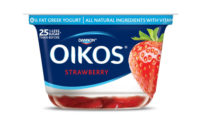Danone North America, White Plains, N.Y., expanded its DuBois, Pa., facility to increase production of plant-based yogurt alternatives. The multi-million dollar investment adds capabilities and creates new opportunities for what is said to be the largest production facility making plant-based yogurt alternatives in the United States.
“As flexitarian-eating patterns continue to evolve and grow in popularity, plant-based food options present an opportunity to bring new choices throughout the grocery store,” says Mariano Lozano, chief executive officer.
Given this opportunity, Danone, the France-based parent company of Danone North America, set a broader global ambition to grow its plant-based business three times by 2025.
The DuBois facility sits on 24 acres, and covers a total of 180,000 square feet. Following the expansion, the facility will produce Vega yogurt alternatives and nutritional powders, in addition to Silk yogurt alternatives, So Delicious Dairy Free yogurt alternatives and dairy-free cheese shreds.
“Dairy-free is different than non-dairy – dairy-free options must be produced in a facility that is solely dedicated to plant-based food production. As consumers continue to seek out more dairy-free options, having a facility that meets this standard gives us an opportunity to deliver on their growing demand and high expectations,” says Lozano.
“We’re proud to be a part of the DuBois community where we are now making several of our beloved plant-based products for our Silk, So Delicious Dairy Free and Vega brands,” says Chad Stone, plant director at the DuBois facility. “Our expertise in plant-based foods is made possible by the dedication of people in the facilities like DuBois where we focus on production to support this important area of growth. The community is incredibly important to us, and we’re thrilled to open more than 60 new positions now that our facility has grown.”
“Many people who enjoy our products look for plant-based options because they are interested in lessening their impact on the environment through diet,” says Stone. “Recognizing this is a priority for the people we serve; we are committed to continuously improving our environmental practices to ensure they are best-in-class. We have several projects underway, including minimizing waste, reducing electricity consumption by converting to LED lighting across all areas of the DuBois facility and creating efficiencies for water use in our cleaning processes.”
In 2018, the DuBois facility reduced energy usage by 9%, and reduced cubic meter per ton of water consumption by 6% compared with the prior year. Of the facility’s total waste generated, only 7.5% went to landfill, with the majority being diverted to recycling and re-use.



